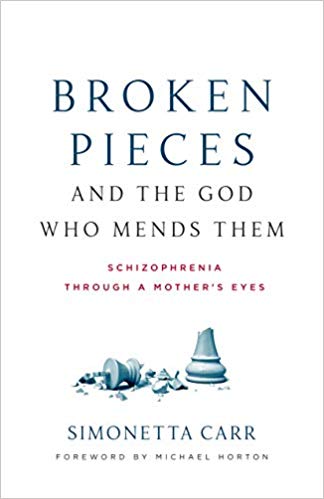Book Review: Broken Pieces


Broken Pieces and the God Who Mends Them: Schizophrenia Through a Mother’s Eyes, Simonetta Carr. Phillipsburg: P & R Publishing, 2019. Softcover, 359 pages.
Though it deals with a gut-wrenching topic, I could not put this book down. I bought it on a Saturday afternoon and had it finished by Tuesday morning. It’s compelling reading about a family’s struggle with mental illness. Simonetta Carr’s son Jonathan developed schizophrenia and it turned their world upside down.
The book consists of two parts. The first is the story of Jonathan and the Carr family. You won’t be able to read it without tears. The second part is about coming to terms with mental illnesses like schizophrenia. How can affected families find the support and help they need? The author answers questions related to medication and other treatments, including Christian counselling. She discusses self-medication through tobacco, alcohol, and marijuana. What about when a spouse is the one with mental illness? She offers solid theological reflection on suffering in the Christian life and how to cope with it.
There are at least four things that bring me to highly recommend Broken Pieces.
First, there’s the forthright honesty in describing the struggle Carr’s family faced with Jonathan’s illness. The author made herself vulnerable in doing this, but the benefit is that readers unfamiliar with such experiences get a clear picture of what it’s really like. That helps to create empathy for those suffering with mental illness in their family. Those who are familiar with these issues receive affirmation that they’re not struggling by themselves – there are others out there who have gone through similar challenges.
Next, I really appreciate Carr’s emphasis on the church and the ordinary means of grace (i.e. preaching and the sacraments). Her family belongs to a United Reformed Church in the San Diego area, and this church figures prominently throughout Jonathan’s story. In the second part of the book, Carr stresses how important it is to be part of a solid, gospel-preaching church.
Third, Broken Pieces both illustrates how husbands and wives often deal with the mental illness of a child in different ways. Yet there’s not only description, there are also suggestions on how to manage those differences and even capitalize on them.
Finally, this book has great potential to improve the understanding of the treatment of mental health issues like schizophrenia. I’m thinking especially of our Reformed churches. There is often much ignorance among us about the seriousness of these ailments. In some instances, the focus is entirely on the medical side of things. With others, the illness is (mis)treated as strictly a spiritual problem. Carr contends for a more balanced approach taking everything into consideration.
I recommend Broken Pieces to one and all, but let me especially recommend it to two audiences in particular. First, to all families dealing with mental health issues. It doesn’t have to be schizophrenia. If you’re dealing with whatever mental illness, I’m sure you’ll find this a useful read. Second, to all office bearers. Office bearers particularly need to understand the complexities of mental illness so that in our shepherding we don’t hurt, but help. Carr’s book will get you in the right frame of mind to show the love and patience of Christ to those suffering with their mental health.


